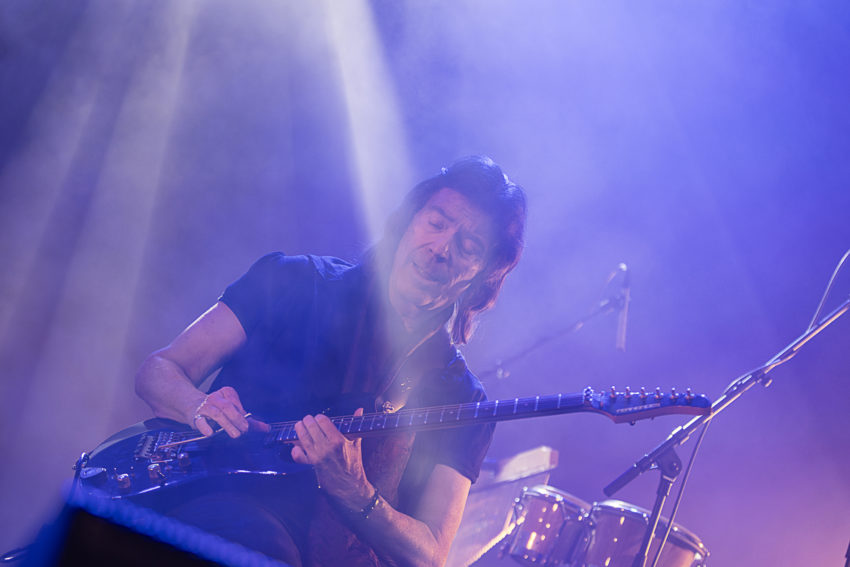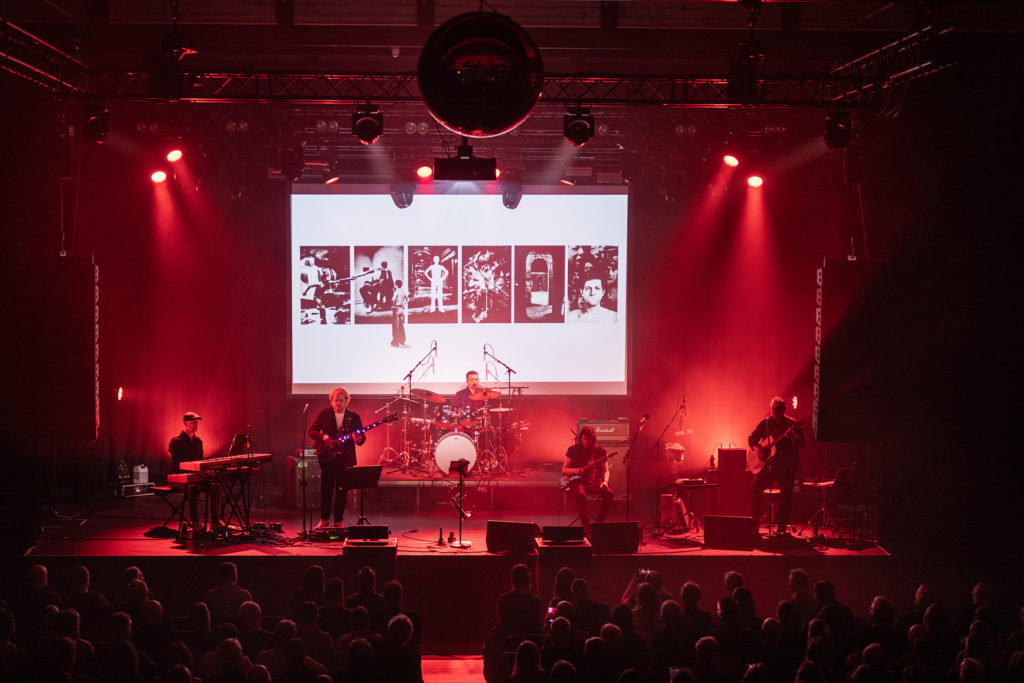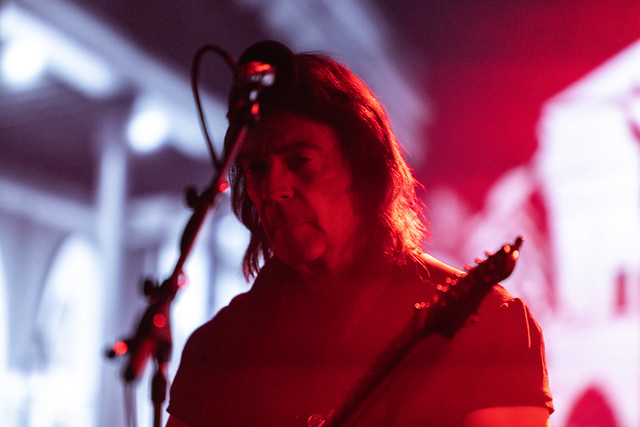Ex-Genesis guitarist Steve Hackett was at the Bodø Jazz Open, sandwiched in between the the two strongest storms in Bodø so far this winter. I met up with him and we talked about his new album, having a concert with the spirit world and having Billboard hits.
Steve Hackett is calm, relaxed and not visibly nervous when we sit down on the sofa in the backstage area of the concert venue Svømmehallen (The Swimming Hall) in Bodø. But when you have toured for over fifty years, played to millions of people, helped make albums that are considered classics, had hits on the Billboard charts and released several solo albums since 1975, it is perhaps not so strange.
Invitation from Ottar in Bodø
Hackett has been to Bodø, north of the Arctic Circle, once before.
– I once played with an acoustic trio, both here and in Tromsø. Coming back has been interesting. The weather has been absolutely extreme! It’s incredibly fascinating.
On Wednesday evening he did a concert in Svømmehallen, with the Hungarian jazz/fusion band Djabe, in connection with the festival Bodø Jazz Open.
– I usually play with them once a year. And then we got the invitation from Ottar [Olaussen] to hold a concert here. I usually play with them in the summer further south in Europe. We often play in what used to be known as Eastern European countries. It’s very interesting, because I meet musicians and people who play instruments that I don’t usually use on my own material. There is a link towards World Music, which goes beyond what we usually call fusion and the like.
– How did your collaboration with Djabe start?
– I was supposed to be on an album with my brother, John Hackett. It was actually his record, but the record company thought it would sell better if it was released under both my name and his. A person from the Hungarian distributor stopped by during the recording and filmed us playing some traditional Hungarian instruments. Then we were invited to play on a record Djabe was working on, and then we played a gig with them in London. This was in the late 90s/early 2000s. We just ended up playing a bit on each other’s projects and concerts.
From Iceland to Azerbaijan
Djabe was going on tour in Eastern Europe and Russia, and they invited Steve Hackett to come with them. At first he only played with them as a guest, but eventually they began to include songs from both Hackett’s solo career and from his time in Genesis.
– Then the founder of the band, their drummer, died, and they wanted to do a memorial concert for him in Petőfi Hall in Budapest. They showed a film of him playing the drums, and the band and I played along to his drumming on the film. During the concert, several other musicians joined, and many of them played lots of instruments I had never seen before, but which were quite common for Hungarians. After we did that, we continued to collaborate a lot. This has lead me to working with African musicians, people from Azerbaijan and many other countries. It all became a melting pot. We have a drummer who is from Iceland, a guitarist who is from England and the rest are from Hungary.
Visitors from the spirit world
Hacketts talks about the many experiences he has had with Djabe, which he describes as magical. When they played in a former synagogue in Slovenia, there was large containers of gold pebbles on display around the venue. Each pebble represented a person who had been killed by the Nazis.
– It was one of the best concerts I have ever played. Something magical happened. I believe in the spirit world and I felt that the spirits of these people joined the concert. It was as if I wasn’t playing myself, but someone was playing me. I have experienced something similar another time when I played near Auschwitz. Whether you want to believe this is up to you, but for me this is real.
New music in February
Steve Hackett has had a solo career going since 1975, even before he left the super group Genesis in 1977. And a new album is just around the corner.
– I will release a new record on February 16. It’s called The Circus and the Night Whale and is an autobiography about my own life. At first it is very literal, but then it becomes more and more metaphorical. I released two singles before Christmas, as a kind of apetiser, and they were very well received. One track has been played a lot on YouTube, at least it’s a lot of plays for an artist like me, and the reaction from the media who have heard the whole album are very positive.
The track he’s talking about is called The People of the Smoke.
– It’s about London in 1950, when I was born. There was a lot of pollution because everyone heated their houses with coal and the steam trains also ran on coal. This song opens the album, starting with sounds from BBC Radio in 1950. It sets the mood that will take you further into the album. It’s a rock album, but there are also quiet moments with a full orchestra and choir. So it crosses many genres and styles.
Glad to be alive
On the day we talk, it is exactly seven years since bassist John Wetton, who fronted Asia, UK and King Crimson, died. He was a good friend of Hackett, and during the concert they play a King Crimson song that Wetton sang. In recent years, Hackett has seen many colleagues and friends die.
– I am just so happy that I am still healthy and still able to make music and play concerts. I started thinking today about all the people I’ve had to say goodbye to. People like Ian McDonald, who actually started King Crimson, and not least bassist Chris Squire from Yes. We worked a lot together, but outside of Yes.
– Yes, I have the album you released under the project name Squackett.
Steve Hackett lights up.
– Yes, that one, yes! Chris offered me to join Yes, but I was just then on the threshold of doing the Genesis Revisited project. I told him I was flattered but declined. We had a lot in common, Chris and I. We both loved classical music and choral singing. After all, he started out as a choirboy.
He continues on the list of friends he has lost.
– The singer Jim Diamond is another one. And not least, it was a shock to lose Jeff Beck! When I recorded the guitar tracks for the new album I thought of him a lot, because he had such a big influence on other guitarists. I’ve worked with Brian May (Queen) and Steve Howe (Yes) and we all had huge respect for Beck. It is easy to think of the guitar as a mechanical instrument, where everything that can be done with a guitar has already been done. But Beck kept coming up with new ways to use it. His influence cannot be overstated.
Going gold in the US
– You mentioned Steve Howe. In 1986 two super guitarists, you from Genesis and Howe coming from Yes and Asia, got together and created the group GTR. What are your memories of that period?
– I really liked Steve’s releases with Yes. And together we had a big hit single called When the Heart Rules the Mind (#14 on Billboard) and a hit album (#11 on Billboard) in the US. The album sold gold over there. My first memories are of us sitting down together on day one and hearing through ideas we both had for songs. He had some instrumental sections that I really enjoyed. But he had built this around a song that I didn’t think was very strong. However, I had a good melody for a song, so the next day I suggested that we could merge the two into one song. And it became When the Heart Rules the Mind. I actually re-recorded that song a few years ago, with Steve Rothery from Marillion. Working with Steve Howe was interesting. We practiced a lot together before we got a record deal and were actually going to sign with Geffen. However, they wanted us to become a new Yes. So then Arista and Clive Davis came and signed us. I think they did a great job with the promotion. In the end, we ended up doing one studio album, and one live album with GTR. Then it was over.
Genesis
The most famous thing Steve Hackett has done is probably Genesis. He was in the band until 1977, when he left, frustrated that his material was being turned down. He was thus involved in what most people consider to be their musically strongest period, but before they became really, really big in the 80s. Genesis gradually played less and less of the classic Genesis material, in favor of the hits, so Hackett started his project Genesis Revisited, where he tours and plays Genesis songs from his time with the band.
In 2022, Genesis held their very last concert. The original vocalist, superstar Peter Gabriel, who left the band in 1975, was present but did not appear on stage. I ask Hackett if he was there.
– I was invited, but I was busy with my own tour at the time. These were concerts that had been postponed several times due to the pandemic, and I could not disappoint my own fans. But I would have liked to have been there, and been photographed with them, and Peter, he he.
– You have done so many different things in your career, what does working with bands like Djabe give you?
– It puts me in a dangerous position. I think of Djabe as a fusion band. But I don’t think of myself as a distinctly jazzy musician. So when I play with them, I have to adapt to their style. They are a bit jazz, a bit rock and a bit prog. And surprising things always happen when we play. There is a lot of improvisation, which means you have to take risks. In my own band, most things are planned in advance, although we allow a little improvisation there as well. But with Djabe, I always have to be prepared for the unexpected. So you can count on listening to both a bum note, a blue note, a brown note and so on. Sometimes I get away with it, while other times it’s just: “Whoops! Sorry!” But taking risks is important. Risks sharpen you. It will therefore be exciting here in Bodø tonight, he he.
The journalist can confirm after the concert that it was worth the risk!
See full photo gallery from the Steve Hackett & Djabe concert here:


